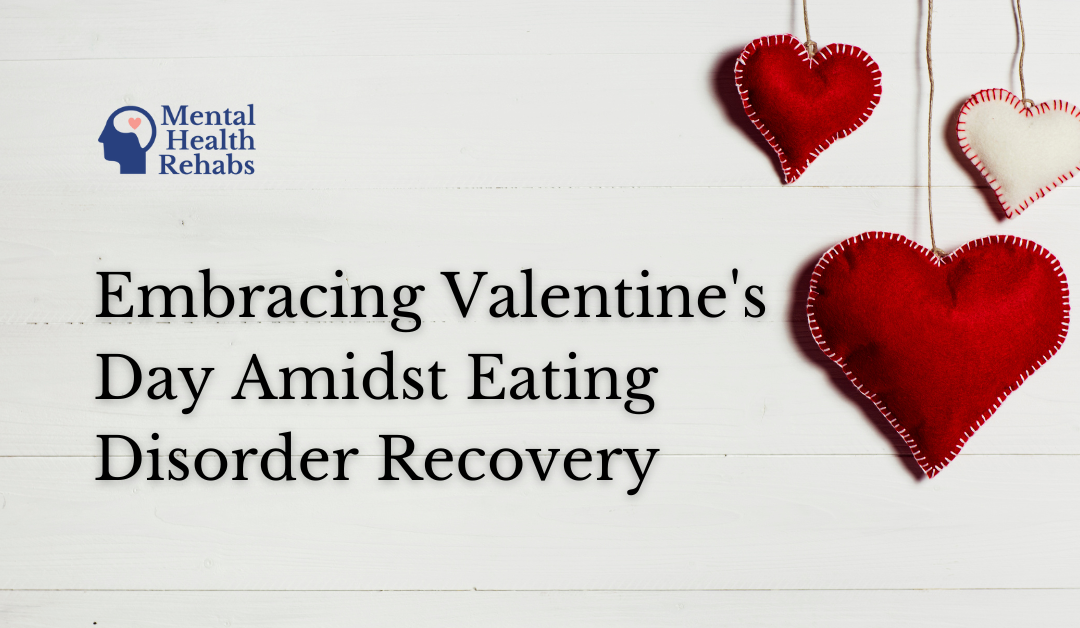Valentine’s Day, widely celebrated as a symbol of love and affection, often emphasizes indulgent dining experiences and the exchange of sweet confections. This focus on food can pose significant challenges for individuals recovering from eating disorders, potentially triggering stress and anxiety.
However, it’s entirely possible to partake in Valentine’s Day festivities while honoring your journey towards recovery. Whether you’re navigating this day for yourself or supporting a partner dealing with an eating disorder, this guide offers thoughtful strategies to celebrate with care and understanding.
Understanding Eating Disorders
Eating disorders and complex mental health conditions manifest through altered eating habits, perceptions of food, body image, and weight. They come in various forms, each with unique triggers:
- Anorexia Nervosa: Driven by a deep fear of gaining weight, it’s often triggered by societal pressures for slimness, body dissatisfaction, perfectionism, and traumatic experiences related to weight or appearance.
- Bulimia Nervosa: This disorder involves cycles of binge eating followed by compensatory actions like purging or excessive exercise. Emotional distress and a history of dieting or restrictive eating are common triggers.
- Binge Eating Disorder (BED): Characterized by repeated episodes of overeating and a feeling of loss of control. Stress, boredom, and low self-esteem are frequent triggers.
- Avoidant/Restrictive Food Intake Disorder (ARFID): This disorder involves avoiding or limiting food due to sensory sensitivity, fear of choking or vomiting, and traumatic food-related experiences.
Valentine’s Day and Eating Disorders
Coming soon after food-centric holidays like Thanksgiving and Christmas, Valentine’s Day adds another layer of challenge. The prevalence of sweet treats in stores and the societal expectation of looking perfect for romantic engagements can exacerbate negative body image and self-perception.
Recognizing these challenges, it’s vital to approach the day with a sense of calm and mindfulness, allowing you to enjoy time with loved ones without compromising your recovery.
Strategies for a Balanced Valentine’s Day
Successful navigation of Valentine’s Day relies on the consistent application of coping techniques. Here are ways to manage the day’s challenges while remaining gentle with yourself:
- Adopt a Balanced Eating Plan: Collaborate with a healthcare professional to develop a diet that includes regular, nutritious meals and snacks.
- Avoid Extremes: Stay committed to your eating plan, but avoid strict restrictions or overindulgence, which can trigger disordered eating.
- Plan Ahead: If dining out, preview the menu online to choose your meal in advance, reducing anxiety.
- Set Clear Boundaries: Communicate with your loved ones about your recovery journey and specific triggers to avoid.
- Incorporate Relaxing Techniques: Practice breathing exercises or mindfulness to manage stress in triggering situations.
- Focus Beyond Food: Engage in non-food-related activities like nature walks, couple’s massages, or creative hobbies.
- Seek Support: Lean on your therapist, counselor, or support group before and after Valentine’s Day.
- Practice Self-Compassion: Monitor your self-talk, replacing negative thoughts with positive affirmations and kindness.
5 Non-Food-Centric Valentine’s Day Ideas
Celebrate February 14th with these alternative plans:
- Creative Home Activities: Engage in painting, crafting, or drawing with your partner or friends.
- Outdoor Adventures: Focus on physical activities like hiking or park strolls.
- Emotional Bonding: Spend time having deep conversations, writing love letters, or sharing memories.
- Volunteer: Offer your time and love by volunteering for a local cause.
- Self-Care Evening: If alone, create a relaxing ambiance with soothing music, aromatherapy, a bath, or meditation.
Supporting a Loved One with an Eating Disorder
Being a supportive partner involves understanding, respectful communication, and emotional backing:
- Educate Yourself: Learn about eating disorders, their symptoms, and potential stressors. Organizations like the National Institute of Mental Health (NIMH) have extensive educational resources about eating disorders.
- Communicate Empathetically: Engage in open, non-judgmental dialogue about their needs.
- Honor Boundaries: Respect their recovery process without pressuring them into challenging situations.
- Provide Emotional Support: Offer a listening ear, validate their feelings, and acknowledge their progress.
- Avoid Sensitive Topics: Refrain from comments about weight, appearance, or food choices.
Navigating Valentine’s Day in Recovery
Valentine’s Day may feel like a hurdle in your recovery journey, but it’s important to remember that recovery includes challenges and triumphs. Prepare mentally, strategize, and tailor these suggestions to your unique needs.
By prioritizing self-care, open communication, and boundary-setting, you can create a supportive environment to celebrate Valentine’s Day while staying true to your recovery goals.

